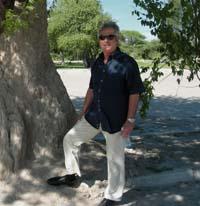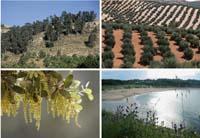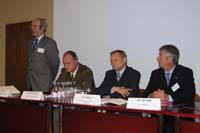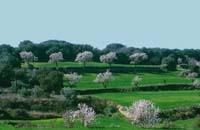José Luis Rubio: "The Mediterranean is very rich but also very vulnerable"

First of all, I would like to say that the center was born in 1996 on the initiative of the CSIC. Now also participating are the University of Valencia and the Generalitat Valenciana, the only European centre dedicated to desertification.
I am head of the soil degradation and conservation department, and in our center we try to investigate those aspects that are essential to know to fight desertification.
Thus, we analyze the relationship between soil and water, as well as the relationship between soil and vegetation. We also investigate pollution, salinization, erosion, fires, droughts and other processes affecting the soil. On the other hand, we have a seed bank, where we carry out the phenology of Mediterranean species, that is, we analyze the periodic biotic episodes (flowering, spreading of leaves, etc.) related to the climate.
In addition, we work on the recovery of degraded soils and advise here at national and international level. We analyze the impact of the change of land use from the socio-economic point of view and, in addition, we work on dissemination.
Indeed. First, it should be made clear what desertification is. In 1998, the United Nations agreed on a definition in the Convention to Combat Desertification and Land Degradation (UNCCD). According to this, desertification is soil degradation in arid, semi-arid and subhumid dry areas.
The unification and concretion of the definition has contributed to knowing what we are talking about, concentrating forces and advancing. Until then many concepts were mixed, and soil degradation from any other place was known by some as desertification. Since then it is clear what desertification is.

Thus, by definition, it is not correct to say that the centre of Europe is deserting, despite the serious problems of acid rain and pollution. The same happens in Euskal Herria, although there are phenomena of degradation, there is no risk of desertification, since the climate is not dry.
Unfortunately yes. Spain is the most arid country in Europe, and the Mediterranean area is the most vulnerable. This space, on the one hand, is really rich, with a great biodiversity. But, on the other hand, it is very vulnerable, the soil takes much longer to recover than in other areas, especially due to lack of rain.
Bear in mind that Spain is a country of droughts and floods. These are extreme situations, provoked by the need to adapt to them.
However, this wealth is threatened and the risk of disease has increased as a result of climate change. According to climate models, in the Mediterranean area the temperatures are increasing, the rains are less and less rains and extreme phenomena are increasing: strong winds, torrential rains, heat waves... And the models foresee that this trend will reinforce in the future.
The evolution of the climate, therefore, is not surprising that it is concerned. So far, however, only provisional measures have been adopted, such as for example to combat severe droughts, etc. But that doesn't solve anything, you have to work without cuts. And before we have to collect information, since we still do not know well how the Mediterranean ecosystem is.
In addition, lately, the human being exerts more and more pressure on the environment. Tourism, fires, the non-sustainable use of water, urbanism, climate change have a huge influence on the soil, and now we begin to see its consequences. However, no continuous analysis has been conducted.

That is. The processes of desertification are complex, often the phenomena overlap and are interrelated. In any case, a scientific analysis of processes is essential to guide and advise governments in the recovery of degraded soils. That is our work.
However, I think it is necessary for society to change its attitude because it does not worry enough. People do not realize the value of the soil. It is not aware that we remove 90% of the food from the ground, which is essential for the water cycle.
For example, fires become protagonists of the summer in the media, but no one realizes that in a fire the accumulated energy is lost for hundreds of years in a few minutes and less the capacity of the soil to maintain life. If the soil disappears by fire and erosion, there is no regression. That is a very serious problem on the peninsula, but people only remember the fires in summer.
Besides fires, there is erosion, salinization and other phenomena. It is urgent to make people aware of these problems so that they can become aware of the dangers and act actively. Essential to combat desertification.
However, little by little we are taking steps. For example, the European Union is preparing a directive on soil. Before it has taken care of the atmosphere and the water and now the turn has come to the ground. It will probably leave in 2007 and will be very useful to take effective measures against desertification.
In this sense, Spain has a great treasure. I will not say that the whole past is good, at all. But it is surprising the amount of shapes that have been invented to take advantage of every drop of water that falls, like the water of the torrents, the water falling to the roof...
The terraces or garden levels on the hillsides are a good example. Farmers have used this technique since remote times to plant it on difficult to cultivate slopes, and today, although many terraces are abandoned, they have a structural function. On many occasions it has received wild vegetation that helps maintain the slope. However, if they are ignored, there is a risk that the torrents of cold drops melt everything with domino effect.

Precisely now I am directing a thesis on the terraces of an area of Valencia. They are investigating when, how, who, why and what they did, and I think this kind of work is very important. It would be necessary to analyze this environmental and cultural heritage, since some of these techniques coincide with the environment, do not need artificial inputs and the workforce is carried out by the people of the environment.
Although today we have more resources than before, the biggest drawback is the lack of continuity of people. The scholarship system does not offer any facility so that the person who has started a job can continue in it, which is a big drawback for us.
On the other hand, working outside is more difficult than working in the laboratory. However, we are advancing in the methodology.
To conclude, I would mention the scarce scientific tradition existing in Spain and the indifference of people with respect to environmental issues. There is still much to do.





